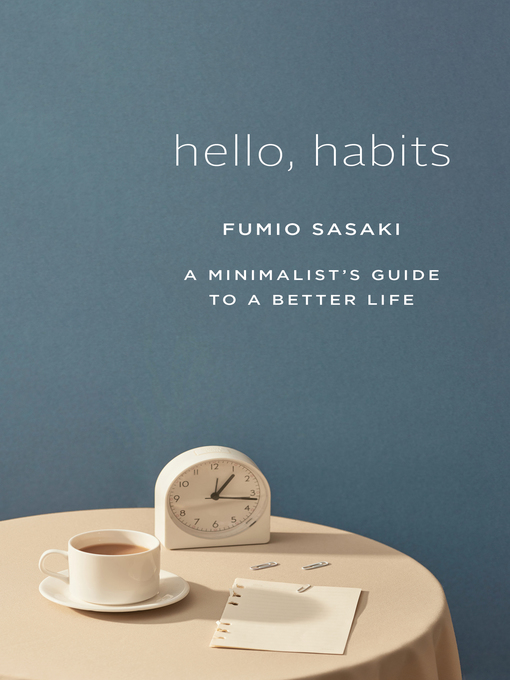
Hello, Habits
A Minimalist's Guide to a Better Life
راهنمای مینیمالیست برای زندگی بهتر
کتاب های مرتبط
- اطلاعات
- نقد و بررسی
- دیدگاه کاربران
نقد و بررسی

November 1, 2020
Japanese author Sasaki first told us to say Goodbye, Things (2017) and now says Hello, Habits. Becoming a minimalist, the subject of his first book, actually only happened because of the habits he speaks of in this one. Across four sections--What Is Willpower?, What Are Habits?, 50 Steps for Acquiring New Habits, and We're Made of Habits--Sasaki clearly and cleanly (minimalist-style) summarizes good-habit-forming behaviors that he has gleaned from a variety of places, and his own incorporation of these behaviors. There is a ton of great tips, like "chunking" out goals into smaller objectives, recording progress, being kind to oneself, and reducing hurdles. Sasaki's personal examples are illustrative, though some readers may not relate to a person who acknowledges he has a lot of flexibility with his time, and others may not appreciate his focus on weight loss. But, in general, while not all the suggestions will work for all people, just about everyone is bound to find something that appeals to them.
COPYRIGHT(2020) Booklist, ALL RIGHTS RESERVED.

November 23, 2020
Sasaki (Goodbye, Things), founder of Minimal & Ism blog, offers a methodology for developing helpful, healthful habits in this handy guide. Sasaki defines habits as “actions that we take with barely a thought” that work through a cycle of trigger-routine-reward, maintaining the behavior by rewriting the nerve cells in the brain. He discusses how rewards are not just material things, but also the sense of satisfaction that comes from a mix of dopamine and stress-induced cortisol. Some of the most powerful rewards of habits take time, he argues, and one must maintain the habit for a long time before perceiving the full benefits. Sasaki breaks the intentional acquisition of a new habit into 50 steps, opening with severing ties with “vicious circles” and relying on life’s natural turning points, such as moving homes or changing jobs, as well as psychological tricks like making a financial investment in one’s intended habit (such as an amateur musician buying a nice guitar) and making starting targets very small. He finishes with habit-maintaining advice like gradually increasing challenges to avoid boredom and chaining new habits onto established ones. Readers who find establishing a routine frustrating will love Sasaki’s methods.

November 15, 2020
A minimalist guru delivers a tepid discussion of remaking one's rotten behavior. "I think this is going to be the last 'self-help' book for me," writes Sasaki, who, some 270 winding pages later, announces that his next book is tentatively titled Quit Alcohol in a Fun Way. Much of the reform he urges in this book about forming better habits involves just that, though it's rarely much fun. "I didn't decide to quit drinking because I understood the disadvantages of drinking," he writes, "it was because I had personally accumulated a lot of experiences of regret." One of those regrets, it seems, is one that the author, who is unmarried and lives alone in a tiny apartment, does not share--namely, the daily grind of paying for a child's education or a car bought on installments, which he considers an exercise in poor prioritization. "We then have to sacrifice our precious sleep," he sighs, "and work to earn money to pay those costs." Sasaki blends jargon (rational thought is a "cool system," emotion a hot one) with a few observations from science, as when he notes that remaking habitual behavior is largely unconscious activity: We do what we do in order to receive the psychic reward of dopamine. We also throw up roadblocks to reforming ourselves by pretending something untoward never happened or "thinking that it's too late to start." The best parts of the book are glosses on others' thoughts, notably those of a certain renowned novelist: "As mentioned before, when working on long novels, Haruki Murakami writes ten pages every day and never misses his hour of running or swimming"; he "says that although he runs for an hour each day, he runs for a little bit longer when he receives unwarranted criticism or a rejection from someone." Pass on this one and turn to Charles Duhigg's The Power of Habit or Wendy Wood's Good Habits, Bad Habits instead. Of minimal interest considering the many better books on the subject already on the market.
COPYRIGHT(2020) Kirkus Reviews, ALL RIGHTS RESERVED.

























دیدگاه کاربران